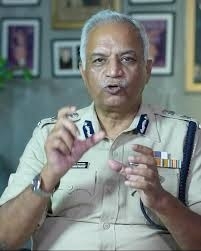Mental Health In Indian Traditions
| Date :11-Aug-2024 |

By DR BHUSHAN KUMAR UPADHYAYA :
It is generally believed that
psychiatry is a modern subject and a gift of the western science. But history tells
that India has had a very comprehensive description and
remedial prescription about
mental health since very
ancient times. The Indian traditions have used two words in
this context - Adhi and Vyadhi.
Adhi refers to all types of mental illness, while Vyadhi indicates physical diseases. The
Ayurveda, Yoga and Indian
philosophical systems have
devised numerous ways to
identify and treat these mental
health issues.
The Atharva Veda describes
many symptoms of mental illnesses which match with
today’s schizophrenia and
bipolar diseases. The Charaka
and Sushruta Samhitas give
very detailed descriptions of
these mental problems and
how to treat them.
Yoga talks
of Chitta Prasadanam or the
pleasant state of the mind. The
Shrimadbhagawad Geeta is a
full text on counselling and
psychotherapy. We find
numerous mentions of these
related subjects in the
Ramayana, the Mahabharata,
Upanishads, Puranas and other literary
works. The
Buddhist and
Jain traditions
are also full of
details as to how
to keep the mind
in a state of stability and joy.
We find mention
in many texts that emperor
Ashok had established many
mental hospitals also.
According to the Ayurvedic
concept, all diseases whether
physical or mental occur due
to imbalance in our human
body. The Ayurveda talks of
Tridoshas - Kapha, Pitta and
Vata. Kapha is the cooling system of the body. Pitta regulates
the heating mechanism and
Vata is the regulator of air in
the body. They all function in
proportion. Any disharmony
in the functioning of these systems causes illness. The
Ayurveda prescribes medicines
and herbs to cure these illnesses including the mental ones.
A very elaborate system of
prayers is also mentioned to
ward off these mental problems. These
prayers contain such
positive words and
counselling reinforcing cognitive
restructuring.
Cognitive behavioural therapy is a very
important tool of
modern day psychotherapy. Yoga talks of
Asanas, Pranayamas and different types of meditational
practices to cure anxiety and
depression.
In the Patanjala Yoga Sutras
the sage Patanjali has mentioned numerous Yogic techniques which cure Chitta
Vikshepa or tumultuous states
of the mind. Patanjali talks of
Chitta Vritti , different modifications of the mind. These
modifications are the cause of
suffering and agony. According
to Patanjali when these modifications are controlled through
practice of Yoga, one attains a
blissful state of the mind. In
the Hatha Yoga Pradipika we
find many Yogic exercises like
different Mudras and Bandhas
which are found to be very
calming and soothing. The
Sthitaprajna state of the Geeta
is the perfect harmony of the
mind , the highest state of
mental health.
The ancient
traditions of Mantra chanting
and devotional songs have got
great therapeutic value and
impact.
Modern day psychotherapy
is prescribing numerous
breathing techniques and exercises to treat anxieties and
depression. These breathing
exercises are different forms of
Pranayamas. In the Buddhist
traditions we find very
methodical and elaborate
mechanisms of meditation
which have the great power to
restructure our thoughts and
emotions.

(The writer is Former DG
Police & CG, Homeguards,
Maharashtra) ■
